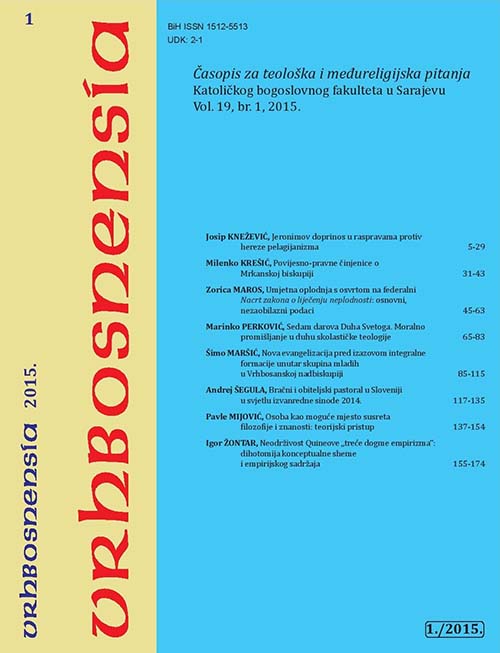Povijesno-pravne činjenice o Mrkanskoj biskupiji
Historical-Legal Facts about the Diocese of Mrkan
Author(s): Milenko KrešićSubject(s): History of Church(es), 13th to 14th Centuries, 17th Century, 18th Century
Published by: Katolički bogoslovni fakultet
Keywords: historical and legal facts; Diocese of Mrkan; Diocese of Trebinje; canonically united;
Summary/Abstract: The author elaborates historical and legal facts about the Diocese of Mrkan. It seems to have been established at the beginning of the 14th century and was immediately united canonically with the Diocese of Trebinje. It was established because of the inability of the bishop of Trebinje to return to the area of the Diocese of Trebinje because at that time the area was ruled by the kings of Raška. Documents from the late 14th and early 15th century clearly show two dioceses canonically united, ruled by one bishop, who is sometimes called the bishop of Trebinje and Mrkan and sometimes the bishop of Mrkan and Trebinje. The seat of the diocese was in a former Benedictine abbey on the island of Mrkan. The bishop’s residence and church were rebuilt in the 1620s. The bishop occasionally lived on the island of Mrkan up to the Candian War (1645-1669), when he had to move permanently to Dubrovnik because of attacks by bandits and pirates. It seems that in those years Mrkan was conclusively abandoned and no liturgical acts were performed there. Bishop Scipio de Martinis (1663-1668) in 1667 performed some ordinations on Mrkan. (is successors – evidence of this has been found from the period of Bishop Sigismud Tudišić (1773-1760)– continued to perform ordinations on the island of Supetar. During the renewal of the church hierarchy in Bosnia and (erzegovina the Dioceses of Mrkan and Trebinje, within their then existing borders, became part of the Vrhbosanska ecclesiastical province. The borders then confirmed, were not changed later.
Journal: Vrhbosnensia
- Issue Year: 2015
- Issue No: 1
- Page Range: 31-43
- Page Count: 13
- Language: Croatian

